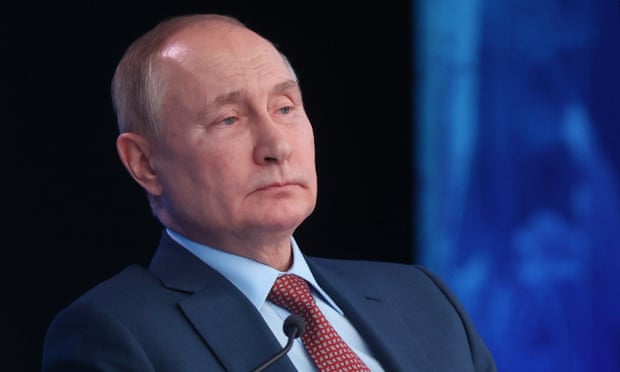The Guardian UK
Editorial
In a documentary broadcast this month to mark the 30th anniversary of the collapse of the Soviet Union, Vladimir Putin told interviewers that during the subsequent economic chaos, he had to supplement his KGB income by moonlighting as a taxi driver. The personal struggles of Russia’s president in the 1990s were offered as a poignant vignette, symbolising the humiliating consequences of what Mr Putin has called “the greatest geopolitical disaster of the 20th century”.
In different circumstances, western leaders might be tempted to roll their eyes at the pretensions of one of the world’s most powerful bullies to victimhood. But Mr Putin’s 30th anniversary reminiscences were of a piece with an aggressively revanchist mood in Moscow, as tensions on Russia’s border with Ukraine continue to grow. About 100,000 Russian troops remain massed close to eastern Ukraine, along with heavy weaponry and other hardware transported across thousands of miles. Western intelligence officials believe that no final decision has been taken by the Kremlin on whether to launch a military operation, after having backed separatist pro-Russian rebels in the Donbass region since 2014. But it seems clear that the sabre-rattling reflects a new determination to reassert Moscow’s eroded authority in what Mr Putin considers Russia’s legitimate “sphere of influence”.
On Friday, the Kremlin issued a series of demands to Washington and Nato that would, in effect, rewrite the security settlement that has emerged in former Soviet territories and satellite states. Along with a guarantee that Ukraine would never become a Nato member, Russia demanded the removal of Nato troops and weapons from the eastern European countries that have joined the alliance since 1997. The likelihood of Moscow being granted an effective veto over the deployment of Nato troops and missiles in countries such as Poland and Romania is zero, and the Ukrainian president, Volodymyr Zelenskiy, has been reassured by Nato that the path to Kiev’s membership remains open (although there is no timeframe). But the combination of massed troops on the Ukrainian border and Mr Putin’s willingness to publicly demand the impossible seems extremely ominous.
This week, the Kremlin upped the ante still further, requesting an “urgent” response from Washington and Nato to its demands. Faced with a game of brinkmanship that is escalating week by week, the west has little option but to demonstrate a desire to keep talking and make it clear to Mr Putin that a heavy price in sanctions will be paid in the event of a Russian military incursion. Western solidarity with Ukraine has been bolstered by the new German government’s willingness to block the completion of the Nord Stream 2 gas pipeline, while last week it was reported that the Biden administration was considering sending military helicopters originally intended for Afghanistan. There may also be room for negotiation on issues relating to Nato military exercises and missile placement, if corresponding concessions are offered by Moscow.
Ultimately, however, Ukraine and its western allies are in the uncomfortable position of waiting to find out what the Kremlin’s true intentions are. Having nurtured a decades-long sense of deep resentment at the decline in Russian regional influence and authority, Mr Putin has decided to force a crisis. It must be hoped that he can be convinced that military action would entail such isolation and economic damage that it would be utterly counterproductive.
